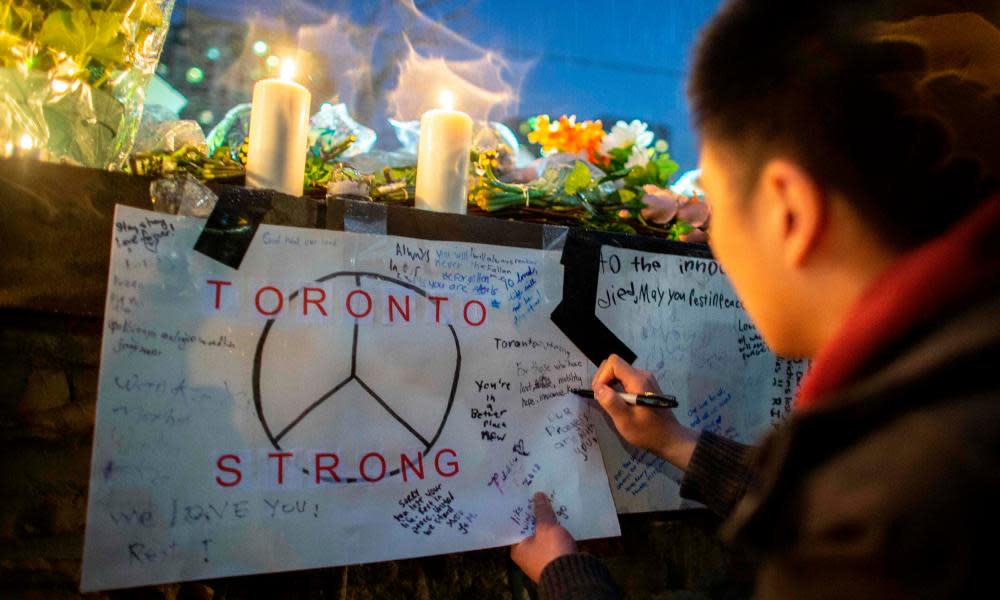Toronto van attack suspect says he was 'radicalized' online by 'incels'

The man accused of killing 10 people by ploughing his van onto a crowded Toronto sidewalk has admitted that he was a violent misogynist who was radicalized online, in a video that was made public on Friday.
Alek Minassian is accused of driving a rental van into a crowd on one of Toronto’s busiest streets, killing 10 pedestrians and injuring 16, in the deadliest act of mass murder in the city’s history.
The attack traumatized Canada’s largest city, and cast a spotlight on the so-called “incel” online subculture of men united by sexual frustration and a hatred of women.
In a nearly four-hour interview after his arrest, Minassian told police officers that he was virgin who had never had a girlfriend, admitted to using the van as a weapon and said he wanted to inspire more attacks.
Asked how he felt about the death of 10 people, he replied: “I feel like I accomplished my mission.”
Minassian will be tried in February on 10 charges of first-degree murder, as well as 16 counts of attempted murder. The video, and transcripts of the interview, were made public on Friday after an Ontario judge lifted a publication ban. Families of the victims were shown the video before it was released to the public.
During the meandering discussion with Detective Rob Thomas, Minassian said he belonged to an online subculture of sexually frustated men, and described his path towards radicalization, saying he drew inspiration from other men who used violence as a form of retribution for “being unable to get laid”.
“I know of several other guys over the internet who feel the same way,” he said, adding they are “too cowardly to act on their anger”.
Clad in a white prison jumpsuit, Minassian told police that his interactions with women left him embarrassed and angry. He described a Halloween party in 2013, where he tried to speak with young women, but was often ignored or laughed at.
“I consider myself a supreme gentleman,” he said, adding: “I was angry that they would give their love and affection to obnoxious brutes.”
Related: Who are the 'incels' and how do they relate to Toronto van attack?
A friend at Toronto’s Seneca College, where Minassian studied software development, first directed him to online message boards for men who identify as “involuntary celibates” or “incels”.
The group views their inability to meet women as punishment for their status as “beta-males” and direct their anger at the people with active sex lives who they derisively call “Chad” and “Stacey”.
Minassian claimed to have been in contact with Elliot Rodger, who killed six people and himself in a 2014 the campus at the University of California, Santa Barbara, in 2014. Rodger was a self-described incel who posted deeply misogynist videos and a sprawling online manifesto calling for an “overthrow” of what he said was feminist domination.
Minassian told police he was “radicalized” at around the time of Rodger’s attack – and began to fantasize about starting his own “rebellion”.
“I was thinking that I would inspire future masses to join me in my uprising as well,” he said.
He told police that he decided that a 10ft delivery van “was the perfect medium size to use as … my weapon”.
While he hadn’t initially chosen Yonge Street as his target – one of the busiest thoroughfares in Toronto – he decided it was “time to go for it” after seeing all of the pedestrians milling about the shops lining the street.
“I’m thinking that this is it – this is the day of retribution,” he told Thomas.
The video also revealed how the attack was stopped.
“Someone’s drink got splashed on my windshield, and I was worried that I would crash the van anyways,” said Minassian, explaining why he stopped the vehicle and got out.
He then sought out a police officer, hoping to provoke a “suicide by cop”. But Ken Lam, a constable, resisted opening fire on Minassian, even though he repeatedly pretended to draw a weapon.
“Unfortunately, he didn’t react,” said Minassian.
Minassian’s trial, which will begin in February 2020, will be overseen by only a judge alone. Minassian has admitted to driving the van but has not yet entered a plea. The judge overseeing the case has said that Minassian’s state of mind will be an important part of the trial.

